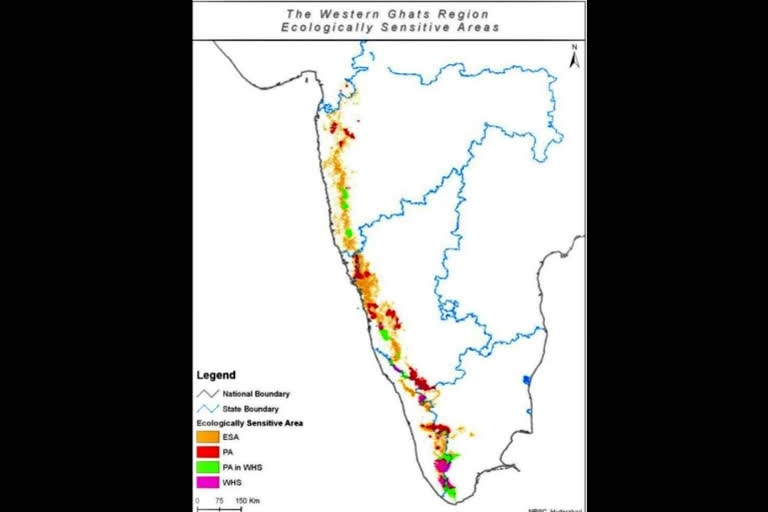Bengaluru: Karnataka is up in arms against the implementation of the Kasturirangan Committee recommendations on the Western Ghats with political parties and farmers announcing a series of agitations against the same from July 27.
Though the ruling BJP government in the state has assured of resorting to the legal course of action to prevent the Union government from implementing the recommendations, the silence of 25 BJP MPs from the state in connection with the issue is being flayed. Out of 28 Lok Sabha seats, Karnataka had elected 25 BJP candidates in the last parliamentary elections.
The central government has issued a notification for the fourth time in connection with implementing the report. Farmers and politicians have decided to launch the agitation on July 27 in Hassan district. The bandh will be observed in Kodagu and Chikkamagalur on July 28 and 29.
Kasturirangan Committee recommendations
The Kasturirangan Committee formed by the Union Ministry of Environment and Forests aimed to water down the environmental regulation recommendations proposed by the Western Ghats Ecology Expert Panel’s Gadgil report in 2012. The Committee submitted its report on April 15, 2013. It recommends the classification of 56,826 square kilometres (37%) of the Western Ghat region, including the area in Karnataka and other states, as Ecologically Sensitive Area (ESA) as compared to 64% suggested by the Gadgil report.
Also read: Plea in SC against Centre's notification demarcating areas as Western Ghats ESA
Out of this, 20,688 square kilometres fall in Karnataka state covering 1,576 villages. The report recommends a prohibition on mining, quarrying, setting up of red category industries and thermal power projects. It also proposes to distinguish between cultural (58% occupied in the Western Ghats by it like human settlements, agricultural fields and plantations) and natural landscape (90% of it should come under ESA according to the committee).
According to the committee, the current mining areas in the ESA should be phased out within the next five years, or at the time of expiry of the mining lease, whichever is earlier. The report calls for not allowing any thermal power projects in the area. If the recommendations are implemented, around 704 villages in the Western Ghats area will be directly impacted. Construction activity, both commercial and private, will face a major roadblock and will, in turn, impact the livelihood of thousands of people in the area.
Stiff opposition in the state
The Karnataka government has already rejected the report and opposed its recommendations. It is feared that the development of the region will suffer with the implementation of the report. Chief Minister Basavaraj Bommai had earlier clarified in the virtual meeting with Bhupinder Yadav, Union Minister for Environment, Forest and Climate Change that classifying the Western Ghat region as a sensitive zone will impact the lives of the people of the region and affect their livelihood.
He also added that the proposal is opposed by the people as well as the state government. A decision to this effect was taken during a cabinet meeting. The protesters have planned to file petitions from villagers to the Ministry of Environment. It is also being planned to meet the Union Minister for Environment, Forest and Climate Change by the end of July.
Also read: Greens oppose 1400 check dams in fragile Western Ghats
On Tuesday CM Basavaraj Bommai held a meeting with MLAs and his cabinet colleagues to discuss the Kasturirangan report on the Western Ghats. Thirty MLAs including former CM B S Yeddyurappa, Home minister Araga Jnenendra, Speaker Vishweshwar Hegade Kageri, Labour minister Shivaram Hebbar, and Tourism minister Anand Singh were present at the meeting.
"We had opposed the Gadgil report in 2008 on the Western Ghats and in 2019 and 2020 also sent a clear message through a letter on the Kasturirangan report to the centre. Even though the central government has implemented its 5th memorandum on the Western Ghats in this regard. The people who come under this area have an emotional attachment to it and implementing the recommendations will end their livelihood," minister Shivaram Heabbar said after the meeting.
"We have decided to fight the issue legally and will discuss in the next cabinet meeting the next course of action. We meet Union environmental minister Bhupendra Yadav and apprise him of our disagreement," Heabbar added. The team of MLAs from the state will go to Delhi on 25th July.



